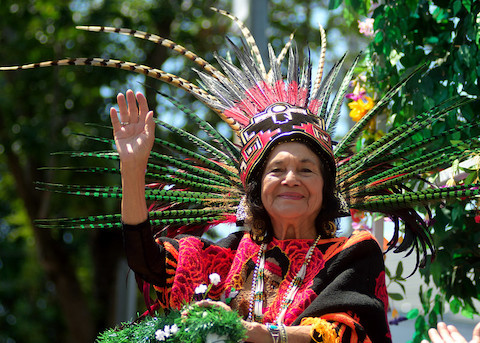
21 Oct Dolores Huerta Reflects on Six Decades of Organizing and the Fight Ahead

Famed labor leader Dolores Huerta was parade grand marshal at Carnaval in San Francisco in 2016. (“Dolores Huerta” by Tom Hilton / Flickr / CC BY 2.0 license)
By America Leon
Civil rights icon Dolores Huerta has organized for people’s rights for decades, most notably as co-founder of United Farm Workers. Now, at 95, she continues to advocate for women’s, Latino, immigrant and labor rights.
She spoke Sept. 18 as part of the CalEndow Live series about her long history of activism and recent attacks on immigrant communities.
Huerta first became involved in community organizing through churches and community groups, before joining the Stockton branch of the Community Service Organization where she met her mentor, Fred Ross Sr., and longtime collaborator Cesar Chavez, with whom she co-founded the National Farm Workers Association.
“You meet in people’s home[s], and you talk about the issues, and people can express what their fears and what their hopes are,” said Huerta, describing the approach to community organizing that Ross introduced her to. “I found out that this is the way you make things happen: bringing people together, taking collective action together.”
This was the strategy she and Chavez used to organize the farm workers union. “We did house meetings for three years, from 1962 to 1965,” said Huerta.
She added that the initial plan was “not to go on strike until 1968,” but when the Filipino farmworkers went on strike in 1965 in what is known as the Delano Grape Strike and Boycott, the NFWA decided to join them, leading to the creation of the United Farm Workers union. “We unified, and we were successful in the long run.”
Huerta recalled the harsh conditions that farmworkers faced at the time. “They didn’t have rest periods. They didn’t have the right to organize. They didn’t have any kind of disability insurance [or] unemployment insurance. … They were talked down to. They were insulted. They were threatened.”
Though she played a central role in organizing the farmworkers’ strikes and grape boycott, she largely credits the farmworkers themselves for the movement’s success. Farmworkers shared their stories, enabling them to gain support for the movement nationwide, in the big cities, and as far away as Canada and England, said Huerta.
The strike, which lasted five years, could not have been sustained without unity, preparation, and “people power,” said Huerta. People showed their support and helped the strike succeed by boycotting and making donations.
Today, she continues to be a powerful voice and advocate for women, Latino, immigrant and labor rights through the Dolores Huerta Foundation.
The foundation’s largely volunteer-led work has included “trying to close a detention center that has been opened for immigrants” and “trying to get a soccer field for a lot of the young people there,” she said.
Huerta said the government’s execution of mass deportations has made people of color the targets of anti-immigrant raids.
“People are just living in terror and in fear,” said Huerta.
She spoke out against the characterization of immigrants as criminals, mentioning a Border Patrol operation in Bakersfield in which 78 people were detained but only one had any kind of criminal or immigration record.
“I think we should change the narrative … They are not immigrants,” she said. “The people that are being attacked are the Indigenous people of the continent, primarily.”
These anti-immigrant acts and rhetoric have hurt the economy, she added, as many members of the Latino community have avoided going outside, changed their shopping habits, and had to close down their businesses for their personal safety.
>>>I Went Back to L.A. After the ICE Raids. One of My Favorite Areas Felt Like a Ghost Town<<<
Amid the “heavy political moment that we are living in,” Huerta called on people to take action. “It’s up to us to save democracy,” she said, emphasizing the power of voting, sharing resources, and supporting one another during these challenging times.
“Always use your presence,” said Huerta, encouraging people to step out, stand up, and make their voices heard with action, music and activity.
The formation of new organizations and the increasing involvement of young people in organizing today are two things that she says give her hope.
“Now there are dozens of organizations that are out there, all working on different policy changes and making changes in the community,” said Huerta. “This is a really positive sign.”
She also highlighted abortion access as a women’s rights concern as well as the rights of LGBTQ people. In reference to both issues, Huerta said, “Respeto al derecho ajeno es [la] paz / respecting other people’s rights is peace,” quoting the late Mexican politician Benito Juárez.






No Comments